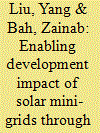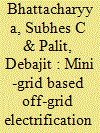| Srl | Item |
| 1 |
ID:
180096


|
|
|
|
|
| Summary/Abstract |
Renewable energy based mini-grids offer a critical solution for universal access to energy in sub-Saharan Africa. We conduct a survey in rural Sierra Leone to measure the perception of local beneficiaries of two solar mini-grid projects vis-à-vis renewable energy potential, community engagement and poverty alleviation. By applying a simple mediation model, we find that the community engagement plays a significant role of chain of influence between renewable energy and poverty reduction - each 1% increase in the perceived renewable energy potential can lead to a 0.195% increase in the perceived poverty reduction, resulting from the community engagement. This mediating effect of the community engagement accounts for around 60% of the total effects of renewable energy on poverty reduction. These findings suggest that empowering the community is essential to creating electricity demand and delivering development impact of renewable energy based mini-grids in the deep poverty context.
|
|
|
|
|
|
|
|
|
|
|
|
|
|
|
|
| 2 |
ID:
150658


|
|
|
|
|
| Summary/Abstract |
With 1.2 billion people still lacking electricity access by 2013, electricity access remains a major global challenge. Although mini-grid based electrification has received attention in recent times, their full exploitation requires policy support covering a range of areas. Distilling the experience from a five year research project, OASYS South Asia, this paper presents the summary of research findings and shares the experience from four demonstration activities. It suggests that cost-effective universal electricity service remains a challenge and reaching the universal electrification target by 2030 will remain a challenge for the less developed countries. The financial, organisational and governance weaknesses hinder successful implementation of projects in many countries. The paper then provides 10 policy recommendations to promote mini-grids as a complementary route to grid extension to promote electricity access for successful outcomes.
|
|
|
|
|
|
|
|
|
|
|
|
|
|
|
|
| 3 |
ID:
166957


|
|
|
|
|
| Summary/Abstract |
We use a discounted cash flow model to explore the impact of electricity pricing and cost sharing rules on the economics of a small wind-powered mini-grid project in Kenya, designed around local tea factories as a demand anchor and connected to the national grid. The results show that including rural domestic and small business consumers in the project increases the overall economic benefit, illustrating the potential gains from using the tea factories as a demand anchor. However, the results also demonstrate that how costs are allocated to different consumer types impacts on participation and on whether the full benefits could be attained. If all consumers must pay towards the infrastructure they use according to their consumption, domestic consumers with low energy demands would not join the mini-grid. Cost sharing rules can be designed where tea factories, small businesses and domestic consumers all individually benefit and would therefore have incentives to participate. However, when the mini-grid is owned by the tea factories there are also possible outcomes where they might prefer to exclude domestic consumers. The results emphasise the need for policy makers to consider appropriate mini-grid tariffing regulation and how these tariffs interact with any existing national electricity pricing systems.
|
|
|
|
|
|
|
|
|
|
|
|
|
|
|
|